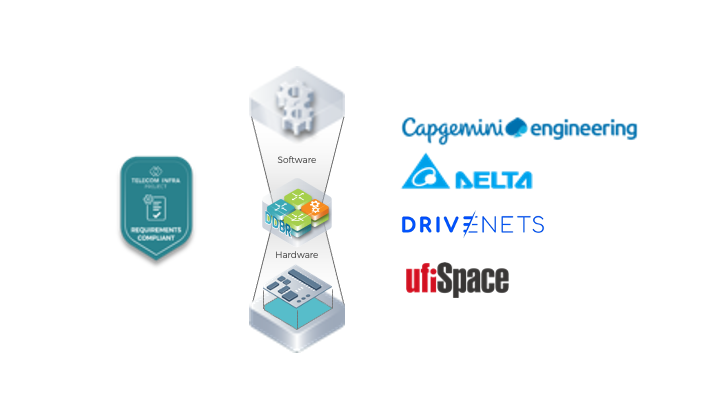Author: TIP News
The OOPT project group has awarded Telecom Infra Project (TIP) Requirements Compliant Ribbons to Capgemini Engineering, Delta Electronics Inc., DriveNets and UfiSpace that accredit their solution readiness against the DDBR Requirements.
Following a detailed analysis of the vendor responses received as part of TIP’s Test & Validation process, the project group is excited to announce that products from Capgemini Engineering, Delta, DriveNets and UfiSpace meet the eligibility criteria of the Disaggregated Distributed Backbone Router (DDBR) solution defined within the OOPT Disaggregated Open Routers (DOR) subgroup.
DDBR is an operator driven initiative led by KDDI, MTN, Telefónica, and Vodafone that defines the operator requirements of an open and disaggregated solution for core applications including P and Peering Routers.
The key objective of this initial validation phase is to grow the DDBR vendor landscape by creating a multi-vendor product composed of two key components (HW & Network Operating System (NOS) SW). In addition, through this process participants in the DOR subgroup not only have a clearer understanding of the available products in the current market but they have also gained a valuable insight into how an ecosystem where different technology partners work more closely with operators to meet their requirements can more effectively contribute to the introduction of open and disaggregated solutions to their IP/MPLS networks.
The successful products will be listed in the TIP Exchange shortly and will continue to pass through the TIP end to end process moving into lab validation to secure TIP Bronze, Silver and Gold badges.

Diego Mari Moreton, Connectivity Technologies and Ecosystems Manager at Meta and TIP OOPT Technical Lead said “DDBR is an exciting initiative. The solution designed by the operators offers a flexible model for increasing the network bandwidth whenever required. The solutions awarded provide open SDN interfaces so operators can run their networks in a more agile manner and develop value added services for their customers.”
Eva Rossi, Head of Transport, Vodafone said “The selection of first requirements compliant solutions for Distributed Disaggregated Backbone Router is a step forward towards the openness and disaggregation of IP Core Transport networks. It will enable to select best-of-breed software and underlying hardware, innovate more quickly and drive the industry ecosystem through joint TIP and operator collaboration.”
Kenji Kumaki, General Manager and Chief Architect, Technology Strategy & Planning at KDDI said “I am proud to announce today the first DDBR compliant vendors. KDDI completed a commercial testing using DDBR as internet gateway peering routers in March and the solution has proven that it has enough capability to be deployed in KDDI production networks. DDBR enables service providers to choose an appropriate combination of software, hardware and semiconductor chips depending on use cases in their production networks. I believe that DDBR will become an industry standard that many, if not all, service providers will adopt.”
Jesús Folgueira Chavarria, Head of Transport & IP Networks at Global CTIO, Telefónica said “At Telefónica, we are thrilled to see the first products from the TIP DDBR initiative arriving to operational networks in the industry, that shows how open and disaggregated IP/MPLS networks are maturing with the extension of their footprint to the backbone and peering network segments. After this important milestone, we are looking forward to work alongside the industry in advancing the carrier grade commercial-ready solutions to be deployed in all our networks”
Lloyd Mphahlele, General Manager: Transport & OSS, MTN Group, said “It has been a pleasure being part of this journey with other global operators within the TIP OOPT DOR subgroup. We have shortlisted compliant vendors against a carefully defined set of requirements (HW and SW) for the Distributed and Disaggregated Backbone Routers. Our transport evolution strategy, centred on a use-case driven approach, is based on the use of devices whose data forwarding, control and management planes are decoupled to simplify the network and ease automation as underpinned by our CASSI framework. We look forward to testing compliant products in our networks and move forward with large scale deployments. We encourage other operators to join and benefit from such devices which greatly simplify the operating model while lowering the TCO of transport networks.”
